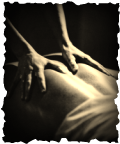"...science is confirming what we know in our hearts: that, as psychiatrist James Gordon put it," massage is medicine."
George Howe Colt
Benefits of Massage
Experts estimate that upwards of ninety percent of disease is stress-related. And perhaps nothing ages us faster, internally and externally, than high stress. Massage is an effective tool for managing this stress, which translates into:
- Decreased anxiety.
- Enhanced sleep quality.
- Greater energy.
- Improved concentration.
- Increased circulation.
- Reduced fatigue.
- Alleviate low-back pain and improve range of motion.
- Assist with shorter, easier labor for expectant mothers and shorten maternity hospital stays.
- Ease medication dependence.
- Enhance immunity by stimulating lymph flow—the body's natural defense system.
- Exercise and stretch weak, tight, or atrophied muscles.
- Help athletes of any level prepare for, and recover from, strenuous workouts.
- Improve the condition of the body's largest organ—the skin.
- Increase joint flexibility.
- Lessen depression and anxiety.
- Promote tissue regeneration, reducing scar tissue and stretch marks.
- Pump oxygen and nutrients into tissues and vital organs, improving circulation.
- Reduce postsurgery adhesions and swelling.
- Reduce spasms and cramping.
- Relax and soften injured, tired, and overused muscles.
- Release endorphins—amino acids that work as the body's natural painkiller.
- Relieve migraine pain.
- What are the benefits of deep tissue massage?
When there is chronic muscle tension or deep tissue injury, there are usually adhesions (bands of painful, rigid tissue) in muscles, tendons, and ligaments.
Adhesions can block circulation and press on the nerves, causing pain, limited movement, and inflammation.
Deep tissue massage therapy works by physically breaking down these adhesions to relieve pain and restore normal movement.

